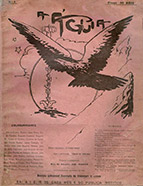

................................
For more rationalist intellectuals like Proença and António Sérgio, who viewed the Renascença movement as synonymous with modernisation through civic education, the priority lay in forming an elite capable of preparing an engaged public opinion. This rationalist perspective saw the adoption of foreign ideas and practices as essential for a renaissance that would begin with economic, political, and social reform, ultimately paving the way for spiritual renewal ( Teixeira de Pascoaes na revista A Águia, p. 29).
Despite the diversity of themes, the multidisciplinary approach, and even the ideological disagreements that sometimes distanced contributors, A Águia featured a shared perspective on history that, while not universally accepted — as shown by António Sérgio's writings — was embraced by many of the magazine’s contributors. Beginning with Jaime Cortesão's essay, A Renascença e a História Pátria [The Renaissance and Homeland History], we see an approach that opposed a history of mere facts and dates, instead promoting historical studies as an expression of patriotism. Cortesão, both historian and poet, viewed it as essential to harness the energy and progress brought about by the Republic, which he saw as reviving the "soul of the homeland," and to instil the "Lusitanian Spirit" in primary and secondary education (and even beyond the school setting), thereby contributing to the cultural nationalisation of Portugal. This "Spirit" hearkened back to the Age of Discovery, embodied in the actions of the common people and the heroism of celebrated figures. Influenced by História da Civilização Ibérica [History of Iberian Civilisation] (1879) by Oliveira Martins, Cortesão praised the heroic deeds of the Portuguese, lauded the national spirit, and sought to analyse the evolution of the great civilisational traits of the nation, from the period of Expansion to the present state of decline ( Águia, Issue 9, September 1912). In another article, reinforcing his belief that history should inspire patriotic sentiment, Cortesão again referenced Oliveira Martins, calling him a "genius historian," to emphasise the importance of mysticism, heroism, and personal independence in defining Portuguese nationality ("Da Renascença Portuguesa e seus intuitos", Idem, Issue 10, October 1912, p. 122).
This work is financed by national funds through FCT - Foundation for Science and Technology, I.P, in the scope of the projects UIDB/04311/2020 and UIDP/04311/2020.
